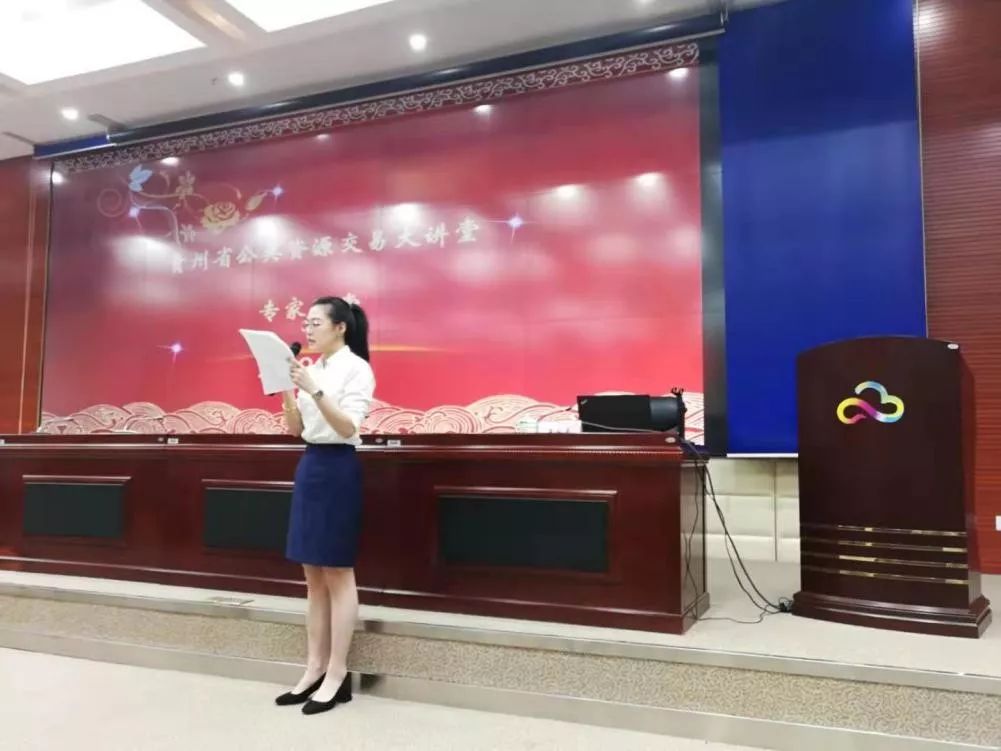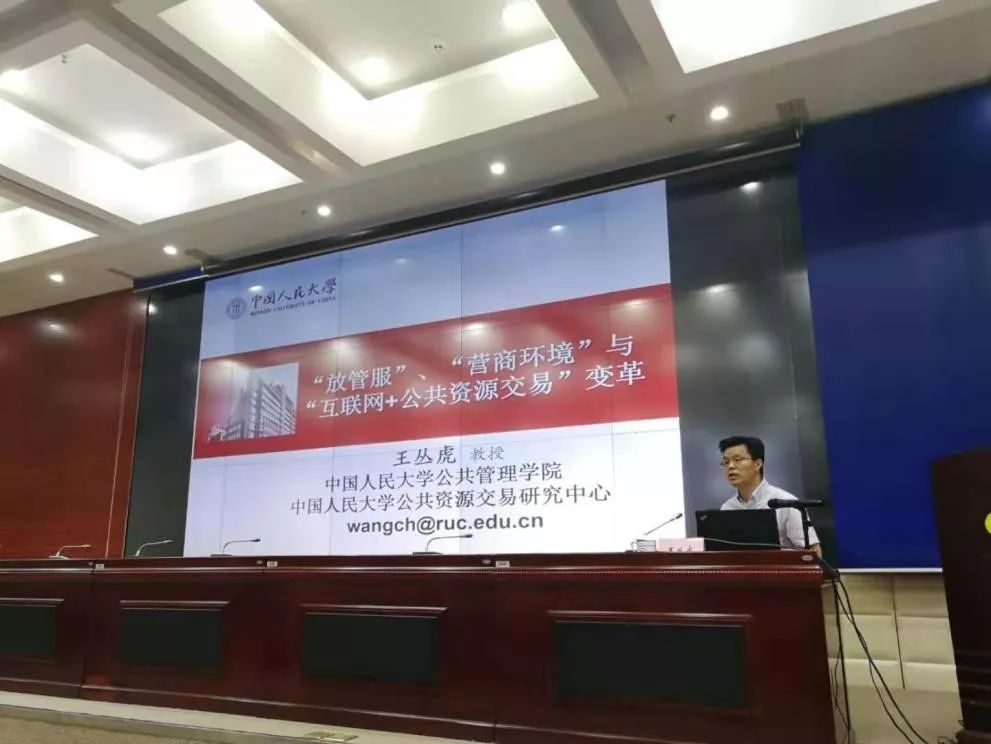current location: 首页 Home News& Events News
Release time:2019-07-31 Number of visitors:
Source:Public Resources Transaction Research WeChat Official Account
Author:Men Yulu
Publish Date:2019-08-06
On the morning of July 31, 2019, Wang Conghu, professor of School of Public Administration and policy of Renmin University of China and executive director of Public Resources Transaction Research Center, gave a special lecture in the multi-functional hall of Guizhou Public Resources Transaction Center on the topics of "Management and Administration", "Business Environment" and "Internet+Public Resources Transaction". "and "Internet+Public Resources Transaction" changes. At the same time, the leaders in charge of public resources trading centers in various cities in Guizhou Province came to learn.

Photo: The moderator announced the start of the special lecture
The moderator firstly expressed a warm welcome to Prof. Wang Congfu, then introduced the basic information of Prof. Wang Congfu, and hoped everyone in the audience would study carefully and actively ask questions to Prof. Wang. After that, the moderator announced the official start of the lecture.

Photo: Professor Wang Congfu starts his lecture
Professor Wang Conghu first mentioned that he had researched five cities in Guizhou Province, and always held the idea of learning from practice, and he believed that those who do practice are always evergreen and should keep learning from practice. Next, he shared the content of this lecture in five parts and hoped that there would be more questions and interactions.
The first part is the decentralization, business environment and "Internet+". First of all, according to Prof. Wang, the theoretical community is concerned with the policy implications, i.e. what has gone behind a policy's proposal. The reform of decentralization has gone through a journey of about fourteen years before it rose from local innovation to policy level. The logic of policy making in China is actually about crossing the river by feeling the stones. The top-level design of the central government is based on the stones scattered at the bottom of the river, i.e. local practices, so local practices are crucial. The purpose of the reform of the management and service is to hope that market players can grow up and become independent. The general direction of reform has been very clear, and what we want to break is the government peddling, while clearing the boundary between government and market and improving citizens' self-governance ability. Secondly, he believed that the public resources trading market is the biggest business environment. Finally, he introduced the connotation of "Internet+". He believed that big data is the means of production, bullets and governance foundation, cloud computing is the productivity, guns and governance tools, while "Internet+" is the production relationship, command and governance means, and China will rise in the era of "Internet+". At the same time, he believes that the reform of decentralization and "Internet+" will boost the reform of public resources trading.
The second part is the positioning and policy proliferation of public resource transactions. He introduced the connotation of public resource trading, China's policy innovation and its proliferation characteristics. In addition, he focuses on the summary of the innovation and proliferation of public resource trading platforms. According to him, the process of integration and proliferation of public resource transactions is divided into four stages: budding exploration, rapid proliferation, smooth regulation, and policy function. The organizational system is one commission, one bureau and one center, and the supervision system includes three modes: comprehensive supervision, comprehensive supervision + business supervision, and decentralized business supervision. Finally, he introduced the current state of the public resource transaction reform. From the decision-making level, it is in the observation period; from the implementation level, it is in the anxiety period; from the theoretical research level, it is in the deep digging and verification period. On the whole, it is in the post-integration period era.
The third part is the evaluation and analysis of the integration of public resource trading platforms. Firstly, he introduces the analytical framework of the current situation of public resource trading integration from four aspects: institution, mechanism, rule of law and tools. Secondly, he introduces the evaluation framework of the integration and development of public resource transactions from three aspects: input indicators, process indicators, and result indicators. Again, he introduces the effectiveness assessment of public resource transaction platform integration in four dimensions: economic effect assessment, administrative effect assessment, social effect assessment, and integrity effect assessment.
The fourth part is the problems and challenges of public resource trading. From the conceptual and value level, there are challenges such as different individual perceptions, differences in organizational perceptions, and conflicts between individual and organizational values; from the theoretical level, there are issues such as the boundary between the government and the market, the relationship between supervision and management departments, and the supervisory departments and the parties involved in the transaction that are worth discussing and pondering; from the level of institutional rules, including the lack of overall rules, insufficient horizontal and vertical convergence of rules, and From the level of institutional rules, the problems include the lack of overall rules, insufficient horizontal and vertical rules convergence, and the lack of specific operating rules; from the level of implementation of laws and policies, the problems include concerns about the use of technical tools, the singularity of public resources trading methods, and the obvious lack of the use of diverse policy tools.
The fifth part is the stage theory and trend of public resource transaction development. First, he introduces the seven-stage theory of international scholars on public procurement. At the same time, he argues that as a way for the government to allocate public resource transactions, the policy objectives of public resource transactions are eternal. Secondly, he introduced the current stages of public resource transactions in China, which are divided into the integration period, the growth period and the maturity period of public resource transactions. Again, he introduced the trends of the development of public resource transactions, including the five trends of abrasion, convergence and unification of legal systems, the balance of diversity and unity of organizational models, the flexibility and innovation of operational mechanisms, and the richness and wide application of policy tools. Finally, he concluded that firstly, system implementation comes from top-level system design and formulation; secondly, top-level design comes from practical innovation and consensus; thirdly, practical consensus comes from learning, imitation and proliferation under the guidance of theory; fourthly, practice is the only standard to test the truth and practice makes true knowledge.
Professor Wang Conghu's wonderful lecture aroused the interest of everyone in the audience and triggered in-depth thinking. Everyone applauded to express their gratitude. After that, the moderator expressed his thanks to Prof. Wang again and announced the successful completion of the lecture.